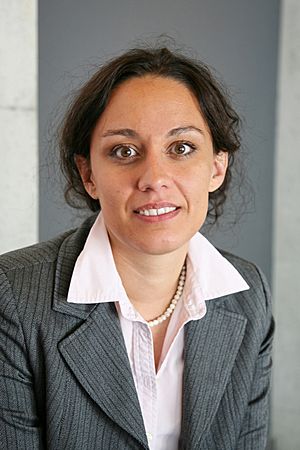Aleksandra Radenovic facts for kids
Quick facts for kids
Aleksandra Radenovic
|
|
|---|---|

Aleksandra Radenovic in 2007
|
|
| Born | 1975 (age 49–50) |
| Citizenship | Switzerland Croatia |
| Education | Physics |
| Alma mater | University of Zagreb University of Lausanne |
| Scientific career | |
| Institutions | École Polytechnique Fédérale de Lausanne (EPFL) |
| Thesis | Development of low temperature atomic force microscope for biological applications (2003) |
| Doctoral advisor | Giovanni Dietler |
| Other academic advisors | Jan Liphardt |
Aleksandra Radenovic was born in Croatia in 1975. She is a talented scientist from both Switzerland and Croatia. She is a biophysicist, which means she studies how physics helps us understand living things.
Her main work involves creating special tools. These tools help her study tiny parts of life, like single molecules. She is a professor at EPFL, a famous science school in Switzerland. She also leads a lab there called the Laboratory of Nanoscale Biology.
Her Journey in Science
Aleksandra started her science journey by studying physics. She went to the University of Zagreb in Croatia. For her master's degree, she studied something called Raman spectroscopy. This is a way to learn about materials using light.
After that, she joined a lab that studied the physics of living things. This lab was at the University of Lausanne. In 2003, she earned her PhD. Her research was about using a special microscope called a cryo atomic force microscope. This microscope helps scientists see very tiny things.
Later, she moved to the University of California, Berkeley for more research. In 2008, she became a professor at EPFL. There, she started her own lab, the Laboratory of Nanoscale Biology. She became an associate professor in 2015.
What She Researches
Professor Radenovic's research focuses on creating new ways to study molecules and cell biology. She uses special tools like biosensors and advanced imaging. She is especially interested in understanding how single molecules work.
Her research follows three main paths:
- Tiny Holes for Molecules: She uses very tiny holes, called nanopores. These holes are made in super-thin materials, like 2D membranes. She uses them to study and even move single molecules.
- Controlling Molecules with Light: She studies how single molecules work. This includes things like proteins and nucleic acids. She uses tools like optical tweezers. These are like tiny light "fingers" that can hold and move molecules.
- Super-Powerful Microscopes: She designs special microscopes. These are called super-resolution optical microscopes. They help her get very detailed information about single molecules.

